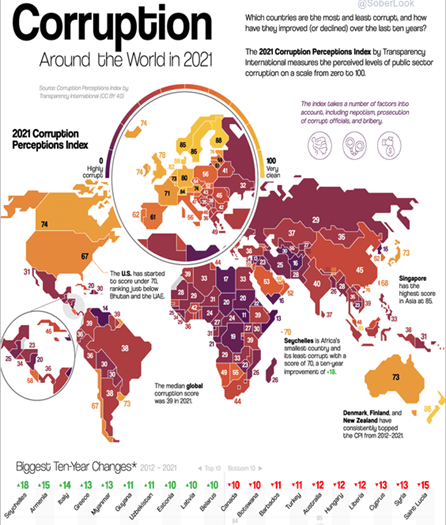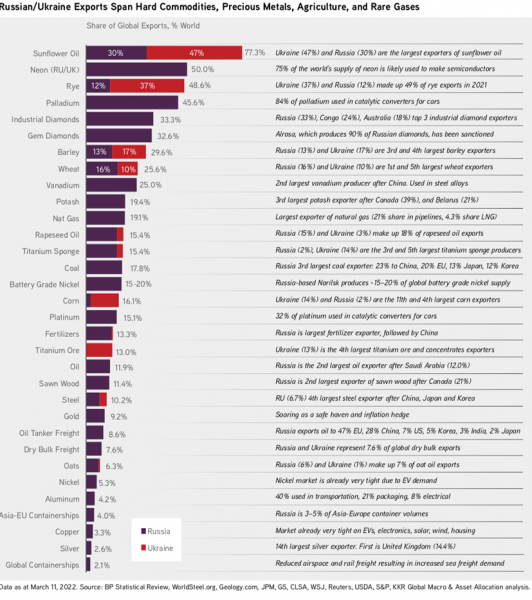The Putin Effect (Stage 1): Geopolitics
Alastair Winter
(Hay una versión en español de este artículo aquí.)
In Chaos Theory, the ‘Butterfly Effect’ describes the phenomenon of a small local change having a large-scale unpredictable impact in a complex nonlinear system. In contrast, the invasion of the Ukraine (giving rise to the ‘Putin Effect’) is a large-scale bloody military exercise that will impact multiple complex systems. Much remains unpredictable, above all because it seems Mr Putin may not have been fully briefed on military, diplomatic, and economic developments by a fearful nomenklatura. Because he seems unconcerned about the bloodshed, it appears that the fighting will carry on for some time. Some form of territorial partition may now seem the most likely outcome, but the Ukrainians have shown no sign of countenancing such an outcome. Nevertheless, seven weeks after the tanks rolled in, it is possible to reach some early conclusions. Let us call it Stage 1.
Geopolitics: empires do not last, tyrannies even less
The fact that neither empires nor tyrannies last is, to put it mildly, a topic that has exercised historians since Thucydides. But where did Mr Putin go wrong? The invasion has reminded us who live in liberal democracies of what tyranny looks like: brutal and ugly, inflicting death and misery on innocents, all accompanied by raucous propaganda.
The prevalence of mobile phones and video cameras allows the horror to be broadcast more widely than ever, even in Russia itself by means of VPN apps. The resulting PR disaster has quickly become a diplomatic calamity by encouraging already hostile neighbours (China being the only important exception) to stand up together to threats against any of them and to fortify their links with the US. Perhaps some farther-away countries (such as India) are seeing opportunities in trading with a sanctioned Russia, but major exporters—including many Chinese companies—are wary of secondary sanctions. Clearly, owing to inadequate military and diplomatic intelligence and his own visceral contempt for the West, Mr Putin miscalculated from the outset.
Most galling of all for a leader who harbours ambitions to restore the conquests of Peter the Great (Malorossiya = Ukraine east of the Dnieper) and Catherine the Great (Novorossiya = the rest of Ukraine) must surely be the clunky failure of his ‘special operations’. Despite all the new equipment and the re-organised command structure, the Russian armed forces have proved as dysfunctional, incompetent, and casualty ridden as usual, admittedly against unexpectedly disciplined and well-supplied opponents. Military analysts will have much more to say, but it does seem as if the balance of conventional warfare has swung even more in favour of defenders, especially if they are as highly motivated as the Ukrainians many of whom descend from the fearsome warrior Cossacks.
Figure 1. Corruption: the enemy within
Source: Visual Capitalist via the Daily Shot
The fact is, for all Mr Putin’s posturing, that the decline of the Russian Empire, which began when it failed to install puppet Communist regimes in Italy and France in the 1970s and 1980s, has carried on since the collapse of the Soviet Union. The disastrous campaign in Afghanistan has turned out to be a more accurate gauge of that decline than the smash and grab in Georgia and Crimea or the ruthless bombing in Syria. Russia is certainly not lacking in external foes, but the real enemy is within: corruption from the Kremlin all the way down to local police and officials.
It is impossible to galvanise a national economy and wage heroic wars when most of the population is struggling to make a living, while criminal gangsters prosper with impunity and the elite jet off to luxury sunspots and shop in designer boutiques. Body bags are the ultimate threat to any regime. It is hard to see the Putin regime surviving the miscalculations, economic collapse and, above all, military failure. Nuclear weapons may deter foreign attacks, but they do not create jobs or fill stomachs. Mr Putin has zealously promoted an aggressive secular and religious ideology of ‘Russian-ness’, but over the next few years Russian people will have to decide whether it may be better just to be ‘European’.
None of this is good news for ‘strong’ or wannabe leaders, whether democratically elected or not. It is especially bad news for those planning to engage in offensive military activity. President Xi tries harder than many to curb corruption arising from one-party rule, but China’s economy is struggling thanks to the increasing number of decisions that appear to require his personal approval. By contrast, corruption under Ayatollah Khamenei continues to thrive. Mr Bolsonaro seems to face electoral defeat in October because of corruption, inequality, and his own incompetence. Mr Erdoğan may lose re-election next year. Mr Modi, however, is still flexing his muscles. As liberal democracies deploy their devastating financial weaponry, it also seems fair to ask whether they, too, are tempted by new imperial ambitions of their own. It would be ironic if the Putin Effect caused them to do so but much better if they set a new historic paradigm by resisting such temptation.
Figure 2. Energy is just one part of the story
Source: KKR
There is much to be done while Russians in economic isolation themselves sort out whether they are a race apart or merely human. The rest of us need to get on with tackling climate change, social inequality and migration.



